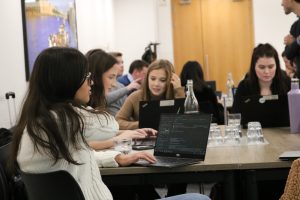The School of Economics, in conjunction with the Government Economic Service began delivering the Professional Economist Degree Apprenticeship Programme in September 2019. In the first edition of our blog, we reflect on our successes so far, whilst also considering the challenges facing our apprentice economists during the Covid-19 pandemic, and how we as a school are developing the delivery of the programme whilst taking apprentice feedback into account.

The Guardian University Awards 2020 Shortlisting
The Professional Economist Degree Apprenticeship Programme, in conjunction with the GES, has been shortlisted for The Guardian University Awards 2020 in the category of Widening Access and Outreach. At the outset HM Treasury’s Chief Economic Adviser was confident the project would “create new opportunities for talented young people from all parts of the communities we serve”; it has gone on to deliver inspiring achievements.
Being shortlisted for this award is a brilliant reflection of the hard work that has gone into this project from everyone involved, from the apprentices themselves, to the employing organisations, project group and the University of Kent staff.
Due to the Covid-19 pandemic the original award ceremony will not be taking place, so we will update you with the results in the Autumn.
New Professional Economist Degree Apprenticeship Programme Director

Professor Iain Fraser will be joining the Degree Apprenticeship Programme from Trimester 2. Iain Fraser is a Professor of Agri-Environmental Economics, whose research interests cover various aspects of agricultural, environmental and resource economics. He has a wealth of experience creating and delivering distance higher education.
You Said/ We Did
In Trimester 2 we asked you to let us know your thoughts and feedback on your apprenticeship so far. Here are some of the points we have been able to act on:
You asked us to make better use of video conferencing to carry out your face to face sessions with your Apprenticeship Advisors.
Your Apprenticeship Advisors love to see you in person, and it allows them a better sense of how you are getting on when they can see you in your work environment, but the Covid-19 pandemic has allowed us to trial new ways of carrying out your face to face review sessions. We will be monitoring the effectiveness of this new way of working going forward.
You asked us to look at the timing of your assessments in relation to your workload from your employer.
After careful consideration, it was agreed that to give you the maximum amount of time “out of work hours” to complete your assessments, coursework would be set on a Thursday at noon, with a deadline of no sooner than the following Monday noon. This allows you the Friday (a study day for most), and the whole weekend to focus on your assignment, without the pressures from your working environment.
You asked for more opportunities to feed into how your apprenticeship was being run.
We created the Apprentice Voice Moodle page, which offers you the opportunity to provide us with feedback at the end of each trimester. We can then take this feedback, and use it to inform future decision making about your apprenticeship. It also houses the Virtual Student Office, which is open during working hours in assessment periods, to allow you to contact support in real-time. Apprentices have engaged really well with this functionality, and we intend to continue running it going forward.
Don’t forget – the Apprentice Voice Moodle Module is there for you – DP234250
Apprentice Focus
Vicky Haigney – Apprentice Economist, Analysis, Microdata and Engagement, Office for National Statistics
COVID-19: My work as an apprentice economist at the ONS
Working in the Labour Market Analysis team at the Office for National Statistics (ONS) has given me a unique insight into the impact of coronavirus (COVID-19).
Labour market data are being used daily to assess the impacts of the pandemic across the UK: a key example being Pay As You Earn (PAYE) Real Time Information (RTI) data used to give experimental monthly estimates about the number of paid employees. ONS data are also being used to identify groups of the population and areas of the economy which may be the most vulnerable to the impacts of COVID-19. This analysis is aiding policymakers and informing decisions made at the top level of government by enabling policy responses to focus on supporting those who need it most.
Recent publications by the ONS that have focused on the characteristics of some of these vulnerable groups include analysis on older workers and the self-employed. As another example, using data from the Labour Force Survey, we have been able to produce analysis of working parents with dependent children under 16, and the industries and occupations they work in. This information allows the government to target childcare and education support to key worker parents who are unable to take time off work during the pandemic.
In my role, I analyse data on a huge variety of labour market indicators. My team and I transform this analysis into a written article, using economic concepts to explain trends and deviations in the numbers. The content of the Labour Market Analysis team’s publications had shifted dramatically as part of a specific, co-ordinated response to the pandemic. We have adapted our publications to specifically analyse the impact that the pandemic is having on the labour market. For our June publication, I wrote a commentary on the effect that COVID-19 has had on vacancies. This explained how the pandemic has directly affected businesses’ confidence to recruit new workers, resulting in the largest annual fall in vacancies since the 2008 to 2009 economic downturn. More impacts of the pandemic are becoming evident in the data each month, this has made my work continually interesting and engaging. Seeing the theories that I learn about as part of my economics degree in action has highlighted to me the significance of understanding and applying economics, particularly in times of crisis.
Calling all apprentices!
Do you feel that you could represent your fellow apprentice’s views to the School of Economics?
Do you feel confident letting us know what you think?
If so, we would love to hear from you!
We would like to form an Apprentice Voice Committee, and are looking for 2 Apprentice Representatives from your year. The role will require attending 3 meetings a year, most likely remotely, where you will be representing the views of other apprentices. Nominations will be open 03/08/2020 and will close on 10/08/2020 12 noon – send your nominations to econapprenticeship@kent.ac.uk. You can of course nominate yourself! Voting will take place 11/08/2020 – 18/08/2020 on Moodle, and we aim to start the next academic year with 2 Apprentice Representatives.

Residential Week 2020
Check your student email for more details about the plans for Residential Week 2020. Send us your suggestions for social events later in the year (econapprenticeship@kent.ac.uk) – we aim to get a social programme together to share with you post-pandemic.
